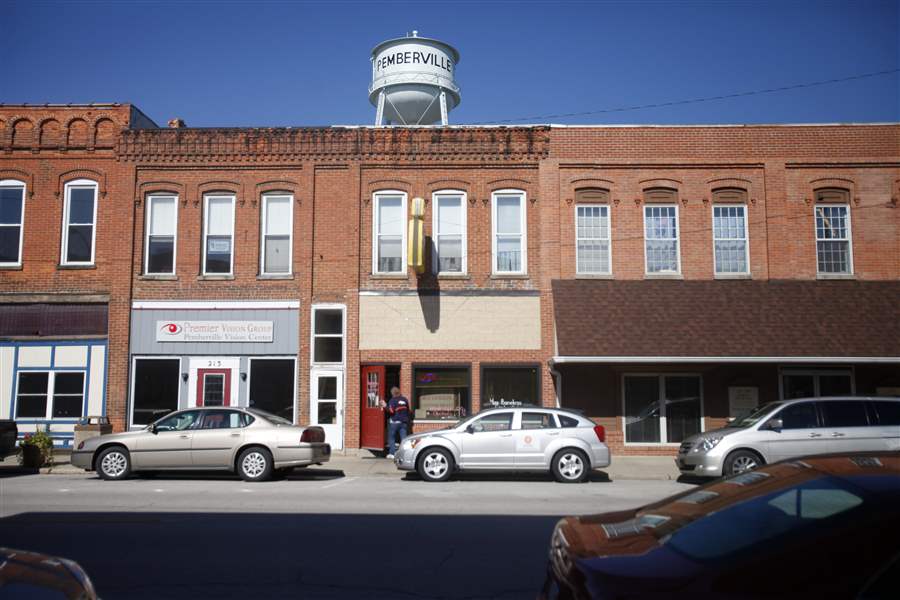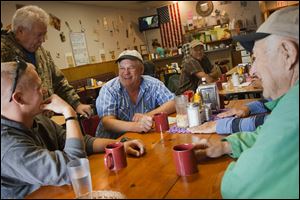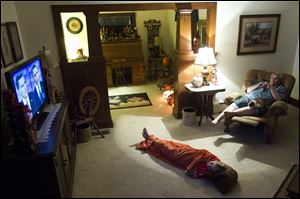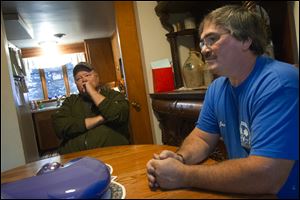
Small town stable financially, divided politically
10/14/2012
A patron enters Janelle's diner in downtown Pemberville. As election day nears, residents are weighing the issues that matter most to them and which candidates for which to vote.
THE BLADE/Jeremy Wadsworth
Buy This Image

A patron enters Janelle's diner in downtown Pemberville. As election day nears, residents are weighing the issues that matter most to them and which candidates for which to vote.
PEMBERVILLE, Ohio — Marcy Abke doesn’t need a cash register.
Though families mill around the front yard of the Abke home checking out stacks of pumpkins and gourds the family grew, there’s no need of a watchful eye for sticky fingers. This operation runs on trust.
Marcy and her husband, Russ, operate a corn maze in their nearly 100 acres that augment Russ’ pay from his electrician job. They raise chickens and turkeys along with the pumpkins and build crafts in their barn. It doesn’t make them rich, but it does provide a little extra money. The operation is more family bonding than revenue source.
Spots dot the yard for people to leave cash. If someone wants a pumpkin, he picks it up and pays. Besides, Mrs. Abke says, if someone feels he has to steal a pumpkin, she figures he probably needs it more than she does.

Jim Witker, center, laughs while other Pemberville residents welcome his son Arik Witker, left, home from his latest tour of duty in Afghanistan while the pair talk over breakfast at Janelle's diner in Pemberville.
Pemberville’s the kind of village where you don’t worry much about locking car doors or about letting kids ride bikes alone down the street. It’s the kind of village where you can trust most people to do the right thing.

Many in Pemberville remain undecided on who they will vote for on Nov. 6.
But Mrs. Abke is worried. Her family’s doing OK, but she worries that the life she’s built, the opportunities she’s found, won’t be there when her children grow up. Two of their children were adopted from Guatemala. The third was their natural offspring; Mrs. Abke was pregnant on Sept. 11, 2001. And the way she sees this country, and the future of her children, is under the haze of that day. Not the terror and the death, but the fear that this country lost something at its core.
“I worry about our children,” she said. “How are they going to pay for things when they are my age?”
Life is good here. But outside Pemberville, things don’t make much sense, and the candidates for president aren’t providing the answers, or at least that’s how some in this Wood County village see it.
Pemberville, in a way, is split between two identities. About 1,400 people live here, and it looks about as small town as you can get. It’s self-contained to an extent, with diners, coffee shops, a general store, surrounded by farms with fields of corn.
But it’s only about a half hour south of Toledo.
The area is a mix of farmers, longtime locals, and commuters who work in bigger towns. It weathered the recession in reasonable shape. The main drag through town, Front Street, is small, though most storefronts remain occupied.
Gordon Bowman, who took office as mayor in January, didn’t run on a message of change. Pemberville’s fine as is.
“I felt like my primary job was to maintain the high quality of life in Pemberville,” he said. “It’s just a really fine place to live.”
But Pemberville didn’t escape the last few years unscathed. The biggest hit was the closing in 2009 of the Modine Manufacturing Co.’s plant, which at one point was Pemberville’s largest employer. When it closed, the village lost 20 percent of its tax base, Mr. Bowman said.
Still, the village is stable. Hirzel Canning Co. has a plant here and uses the Modine plant as a warehouse. There is a metal stamping plant and a grain elevator. Most farmers do OK, though costs seem to rise as quickly as corn prices.
Flavored by an old German community, Pemberville voters tend to be conservative and look for a responsible, fiscally sound government. But it’s also politically split.

Sandy and Henry Lopez proudly display their Democratic signs in the front yard of their Freedom Township home near Pemberville.
In 2008, Barack Obama carried the village with 53 percent of the vote against Republican John McCain, and voters rejected the statewide public employee collective bargaining restrictions last year by a large margin. Yet there are more registered Republicans than Democrats this year, and the village voted in 2010 for U.S. Rep. Bob Latta and state Rep. Randy Gardner, both Republicans. It’s a swing village in a swing state.

An empty chair, a nod to Clint Eastwood's speech at the Republican National Convention, sits next to a Mitt Romney sign in the front yard of a home near Pemberville.
More residents, when prompted, said they’d vote for Republican presidential candidate Mitt Romney this year over Mr. Obama, but a common refrain was less an excitement for a candidate than a frustration with politicians in general. Many criticized gridlock in Washington and an unwillingness to find compromise. Many more said they simply didn’t feel like elected officials represented them anymore.

Former Manufacturing Company employees Ron Nixon, left, and Jamie Haas sit around the Haas family's kitchen table and talk about the state of the nation. Nixon, who says he is a registered Republican, feels the party has passed him by.
“It doesn't look like there’s a good plan from either party,” Mr. Bowman said.
Not that there aren’t partisans around. In front of a house south of the village, an empty chair sits next to a Romney sign, a reference to Clint Eastwood’s Republican Party convention speech. A man at the home didn’t give his name, but said his wife put out the chair after Mr. Eastwood’s speech. He said the sign and chair spoke for themselves.
Mr. Obama, he feels, has divided people on purpose and demonized those who’ve done well financially.
“I think he divides people for political reasons,” he said.
If you’re looking to hear opinions, people in Pemberville said, go to Janelle’s Diner and make sure you get there early. Active and retired farmers, truckers, shopkeepers, and others gather each morning for coffee and conversation.
The consensus on the morning of the first presidential debate wasn’t for one candidate or the other, but that the political system in America is broken.
“One represents the rich, and one represents the poor,” Jim Witker said of the major political parties. “There’s no one to represent the working man or small business.”
While the country faces serious hurdles, including an anemic economy with too few well-paying jobs, politicians seem to have their heads in the sand, Jim Sander said.
In the corner, members of the jokingly self-proclaimed “Pemberville Liars Club” had few nice things to say about the current crop of elected officials. Politicians don’t play by the same rules as everyone else, they said, and few are willing to accept compromise.
The country’s spending money it doesn’t have and neither presidential candidate talks much about how to cut the deficit. Fuel prices are sucking the life out of the economy. Politicians who live in the Washington bubble don’t know how others live and are too busy fighting each other to get anything done.
“Keep what’s good and throw away what’s bad,” Roger Hansen said. “There’s got to be compromise on both sides.”
The barrage of political ads makes them want to push the mute button, and the amount of money in campaigns — and the at times secret sources — makes the election feel like a system of legalized bribes. Seldom does it feel like candidates explain their own plans, instead focusing attacks on their opponents.
Some voters still are on the fence. Others said they know how they’ll vote, but aren’t excited by the options. They’ll likely vote against one candidate, not for the other. They also offered a better voting choice: none of the above.
Bailout’s help, harm
The conventional wisdom in the campaign is that President Obama’s decision to bail out General Motors and Chrysler would help his re-election chances in Ohio. The auto bailout may be popular with many, and may have saved jobs in northwest Ohio, but it didn’t help everyone and everywhere.
Pemberville’s Front Street is one place where it hurt.
Family-owned since 1924, Eisenhour Motor Sales is the kind of place where customers know Jack Eisenhour by name, and where Jack knows what car they drive when they walk in. A couple came in Wednesday after an aborted trip to a West Toledo doctor because their car’s window wouldn’t go up, making the vehicle too cold for their trip. Repairs would mean they’d miss the appointment, but Jack let them use his phone to reschedule and offered a fix.
“Why don’t you say you leave it,” he said, “and I’ll give you something to get home.”
Mr. Eisenhour lost his Chevy franchise in 2010 during the bailout, as GM shrank its dealership network. It seemed GM only wanted to keep relationships with new or renovated dealerships, he said, and he didn’t want to spend the estimated $1 million to update his facilities.
He sells used cars and runs a service shop, so he managed to survive. But business dropped an estimated 10 percent. Just as big of a sting was the hit to his pride.
“After being in business for 80-plus years, it’s sort of a kick in the pants to find out you aren’t needed anymore,” he said.
Mr. Eisenhour said he is a registered Republican. But he’s no Romney booster. He’s just not interested in either candidate.
What matters most
Most days, Rebecca Acosta has her hands full.
Cereal was scattered on a dining room table as one boy pushed back and forth on a skateboard, while another donned a superhero cape and mask. Evenings, Mrs. Acosta works at Owens Community College as a lab instructor; by day, she corrals three young boys and a girl in her Pemberville Road home while her husband, Hector, works in Wood County making car products and detailing vehicles.
The family moved here from the Denver area three years ago to be closer to family and live in a small town. Not overtly political, she tends to worry most about how government programs and tax rates will impact the economy. Yet she views some issues through a personal lens.
Mr. Acosta came to the United States legally, but they have friends who are undocumented. The process to get in the country is too complicated, too expensive, Mrs. Acosta said. There should be an easier path. That position should ally her with Mr. Obama’s immigration policies.
But for Mrs. Acosta, her economic views trump others. Though she might agree with President Obama on some social policies, she is against his tax plan and believes the government is too large. And though she considers herself “on the poor side,” she finds herself turned off by policies and rhetoric against the rich.
Wealth is an incentive for work and too many taxes diminish those incentives, she said. The country doesn’t work if you just take from the rich and give to the poor, she said.
“We need rich people,” Mrs. Acosta said. “They’re the ones who supply the jobs.”
Mr. Romney’s background as a businessman intrigues her, though she’s not sold on him. She even considered the idea of voting for Gary Johnson, the Libertarian candidate, but isn’t sure if he’s a viable choice.
Changing job outlook
Jamie Haas linked his hands atop his dining room table, then separated them, then cupped them. Large and worn from work, these are not idle hands. These hands build things.
Mr. Haas and friend Ron Nixon devoted more than three decades each to the Modine plant, Mr. Haas as a special repairman and industrial core tester, Mr. Nixon working an array of supervisory positions.
Both were there for the good years, when the copper-brass radiator plant employed more than 200 at good pay.
Mr. Haas was one of the last employees to be laid off when the plant closed. Mr. Nixon retired before they could get rid of him. He didn’t want to be there for the end.
It’s hard not to be bitter over how the plant closed, they said. Four months before Modine officials announced an impending end, assurances were given that the plant would stay open, that employees could plan to retire from Modine.
“They’ll be here,” Mr. Haas said Modine told employees.
Then the promises stopped. The plant was going to close.
There was a time in this country, Mr. Nixon said, where people and companies took the long view. Employees committed to a company, put in years of work, and eventually could expect to move up the ranks when they mastered their craft and showed potential. Companies, in turn, invested in the quality of their product and their employees.
But now everyone is focused on the short term. Managers look to climb the next rung. Corporate looks to cut costs and boost stock prices. Cheaper parts are imported. Quality suffers.
“That’s what’s killing American manufacturing,” Mr. Nixon said.
The company stopped investing in the plant and major renovations were needed to bring it up to date. A series of plant managers cycled through. And the union may have priced workers out of jobs, though Modine never held a hard line in contract negotiations near the end. There are always two sides signing a contract, said Mr. Nixon, who had a salaried position at Modine.

A customer browses through Beeker's General Store in downtown Pemberville.
But top executives who shut factories when stock prices plummet get seven-figure severance packages when they leave, he noted.
“Golden parachutes are for people who drive companies into these situations,” he said.
Mr. Haas’ severance went to cover insurance for his self-employed wife. He spent months unemployed.
There’s a perception that the unemployed are lazy. But many don’t understand how frustrating the unemployment system can be, Mr. Haas said. Benefits are based on a percentage of past pay, and there are few $19-an-hour manufacturing jobs available.
Many of the jobs out there are temporary, so Mr. Haas could take a pay cut, and when he lost that job, his unemployment benefits would be based on that lower wage.
He’s on his third job since the Modine plant closed, making $14 an hour and living in the house that he bought while making $19 an hour. He and his wife are doing OK because she works, too; they won’t lose their house, but they can't afford a new truck, even though the one he has now has 200,000 miles.
Mr. Nixon has been a Republican his whole life. But he feels the party has left him. He takes issue with Mr. Romney’s comments about the 47 percent. Not all those people are just sitting at home, asking for a handout, he said. He wishes that Republicans would stop fighting battles he feels were already finished, such as the debate over the federal health-care legislation. If you don’t like it, don’t just attack it, he said, find improvements.
Mr. Nixon is one of the few in Pemberville who said they’d vote for Mr. Obama. But that doesn’t mean you’ll find him with a campaign button or repeating slogans.
“Once more, before I die, I’d like to be able to cast a vote for somebody who wasn’t the lesser of two evils,” Mr. Nixon said. “It’s a crying shame that the American people aren’t represented better by both parties.”
That’s where Mr. Haas is, too. He calls himself undecided, and says he’ll probably have to pick between whom he dislikes less. He can't stand how frequently politicians seem to delay and squabble.
“Why does it have to be, ‘Let’s see how slow we can go?’ ” Mr. Haas said.
What they ought to do, Mr. Haas said, is make politicians live like we do. Maybe then they’ll get something done.
No decision yet
The Abkes are those rarest of voters: the undecided.
While they lean conservative, both said they hadn’t picked a candidate. They hoped the debates would help make up their minds. Maybe one of the candidates would rise above the fray and give real answers, with specifics about how he'd address what's happening in this country.
How would you lower the deficit? Keep costs down for college students? Create those jobs you promise?
With the lights turned low in their house, Mrs. Abke sat on the couch and watched the candidates greet each other, while Mr. Abke watched on a TV in the barn while he worked. But over and over, the pair would listen to the candidates present their visions and plans, and ask, “How are you going to do that?”
As the debate dragged on, they grew frustrated. With their daughter asleep on the floor and a cat resting on Mrs. Abke’s lap, Mrs. Abke criticized both candidates for speaking past each other.
“It’s frustrating, because they talk about these things, but they never say how they are going to do it,” she said.
Mr. and Mrs. Abke paused and sat in silence as they thought.
“Lots of talk,” Mr. Abke said finally. “Lots of smoke.”
And very few answers.
Contact Nolan Rosenkrans at: nrosenkrans@theblade.com or 419-724-6086.